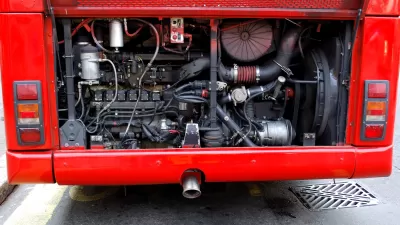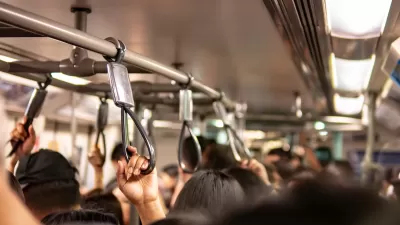Why would the nation's major public transit organization work so closely with America' major road lobbying group, even when it comes to opposing landmark climate legislation aimed at reducing 33% of U.S. greenhouse gas emissions from transportation?
The strange alliance has proved beneficial in Congress, providing a framework for compromise amongst Democrats, Republicans, and urban, suburban and rural interests, notwithstanding the apparent short-changing of the transit advocates.
"Here's one inconvenient truth holding in line the status quo of automobile dependency in the United States: the nation's primary proponent of transit, the American Public Transportation Association (APTA), stands on virtually every issue hand-in-hand with the American Association of State Highway and Transportation Officials (AASHTO), the nation's main advocates of increased highway spending.
APTA and AASHTO have shown themselves committed to retaining a structural funding split in favor of highways over other modes of travel, despite the fact that that reliance systematically enforces automobile dependency. The organizations' approach to the Senate's proposed energy and climate legislation has been little different. in a joint statement in mid-May, APTA and AASHTO argued against the bill because about two-thirds of new revenues sourced from fuel consumption would be directed to non-transportation related investments, equivalent to heresy in their minds."
From Pittsburgh Post-Gazette: Transportation interests oppose new climate bill: "Twenty-eight groups representing government transportation officials, trucking interests, mass transit operators, transit employees, motorists, construction workers and contractors said the legislation would impose higher fuel tax costs but divert most of the money from transportation improvements." [See Coalition letter on transportation funding and the American Power Act"].
However, other transportation groups endorse the transportation approach in the legislation. "The American Power Act represents a key step towards creating a long-term policy that will meet our country's future climate, energy and transportation goals, "said Transportation for America Director James Corless.
Thanks to Marilyn Skolnick
FULL STORY: The Highway-Transit Alliance Strains the Senate's Energy Legislation

Planetizen Federal Action Tracker
A weekly monitor of how Trump’s orders and actions are impacting planners and planning in America.

Maui's Vacation Rental Debate Turns Ugly
Verbal attacks, misinformation campaigns and fistfights plague a high-stakes debate to convert thousands of vacation rentals into long-term housing.

San Francisco Suspends Traffic Calming Amidst Record Deaths
Citing “a challenging fiscal landscape,” the city will cease the program on the heels of 42 traffic deaths, including 24 pedestrians.

Defunct Pittsburgh Power Plant to Become Residential Tower
A decommissioned steam heat plant will be redeveloped into almost 100 affordable housing units.

Trump Prompts Restructuring of Transportation Research Board in “Unprecedented Overreach”
The TRB has eliminated more than half of its committees including those focused on climate, equity, and cities.

Amtrak Rolls Out New Orleans to Alabama “Mardi Gras” Train
The new service will operate morning and evening departures between Mobile and New Orleans.
Urban Design for Planners 1: Software Tools
This six-course series explores essential urban design concepts using open source software and equips planners with the tools they need to participate fully in the urban design process.
Planning for Universal Design
Learn the tools for implementing Universal Design in planning regulations.
Heyer Gruel & Associates PA
JM Goldson LLC
Custer County Colorado
City of Camden Redevelopment Agency
City of Astoria
Transportation Research & Education Center (TREC) at Portland State University
Jefferson Parish Government
Camden Redevelopment Agency
City of Claremont




























